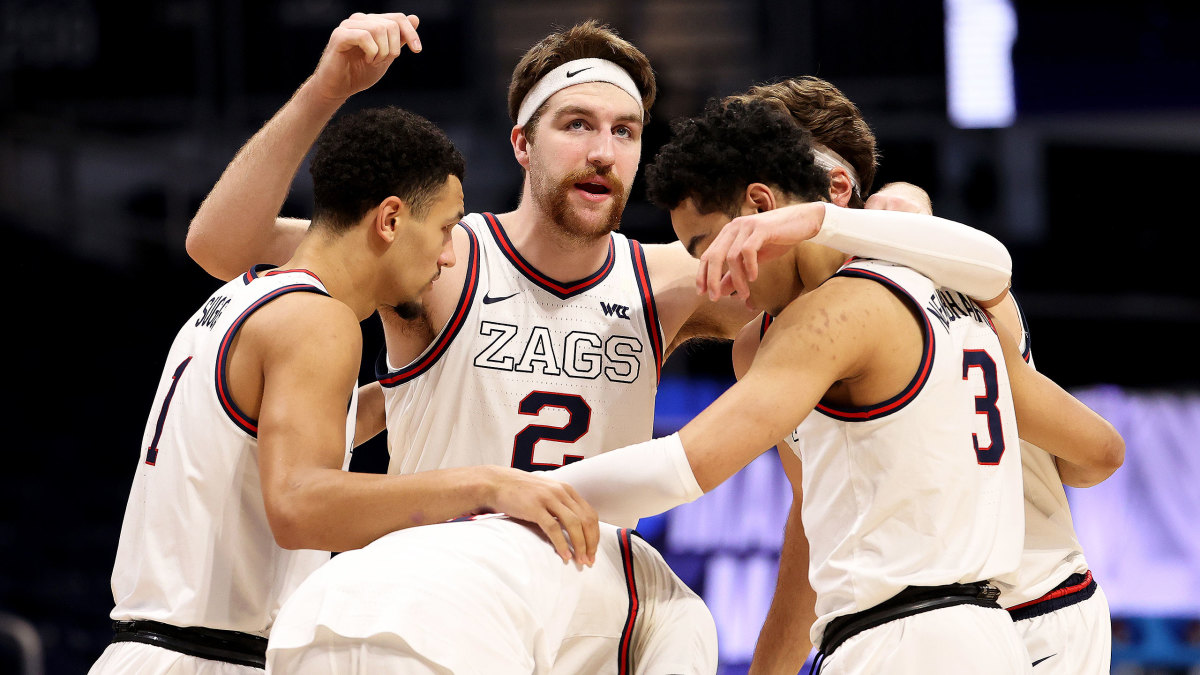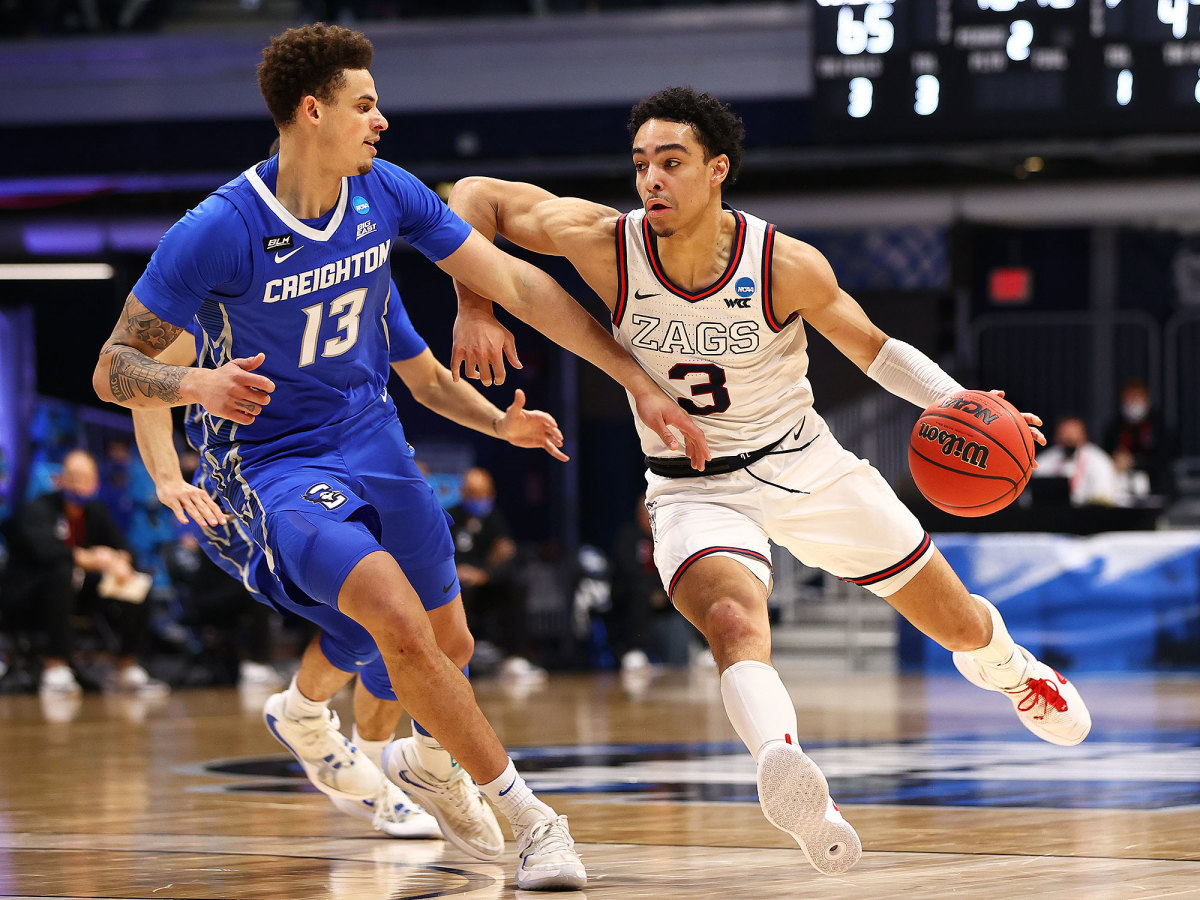The Gonzaga Train Rolls on With a Flourish After Dicing Up Creighton
INDIANAPOLIS — Holed up in the downtown Marriott here, Mark Few says he’s not sleeping well in NCAA tournament lockdown. He doesn’t expect that to change now.
“There’ll be no more good night’s sleep in the bubble,” The Gonzaga coach said Sunday, after his team dispatched Creighton, 83–65, in the Sweet 16. “These will all be really hard games. … Literally the hardest thing we do in our sport is advancing in this tournament. Just look at this year.”
Look at this year and you do indeed see an onslaught of upsets, resulting in the highest aggregate seeding in history. But then you also see Gonzaga, smashing everyone in its path thus far.

Halfway to history, the undefeated Zags are performing like an all-time great team. They have dispatched their first three opponents by a combined 77 points, with the closest victory margin 16. They are averaging 89.3 points per game in the tourney. They haven’t yet experienced a flicker of discomfort in an elimination game, never leading by fewer than nine points at any juncture of three second halves.
In the last 40 years, the only men's national champions who won each of their first three NCAA games by more than 15 points are Villanova 2016, Connecticut ’04, Kentucky 1998 and Kentucky ’96. The highest-scoring national champs of this century through three games are North Carolina 2009 at 94.3 and Kentucky ’12 at 90. Gonzaga is keeping good company—but, again, is only halfway to the finish line.
Few loved his team’s defense against Creighton Sunday, and with good reason. Holding a dangerous perimeter shooting team to five made three-pointers in 23 attempts was strong. But the truly special part of this Gonzaga team is what it does on the offensive end.
Nobody in the college game passes the ball more crisply, creatively and willingly. Player movement and ball movement have long been the coins of Few’s realm, and this is his best team yet in that area. “It’s probably our best attribute,” Few said.
Some teams need to move deliberately to execute well offensively. Not Gonzaga. This is the third-fastest team in the nation at the offensive end, averaging 14.3 seconds per possession, flowing smoothly, recognizing advantages immediately and attacking aggressively. They are a visual feast.
“It's one of the best passing teams I've seen … in college basketball in a long time,” said Creighton coach Greg McDermott.
What the Zags did to the Bluejays’ best defensive team in 15 years was a clinic on modern offense. Gonzaga had 23 assists and made 76% of its two-point shots, carving Creighton to pieces. Point guard Andrew Nembhard destroyed the Bluejays one pocket pass at a time, dropping an array of deft dimes to teammates in ball-screen situations. He finished with 17 points and eight assists, both his highest single-game totals since January.
“I think that's been our identity all season,” Nembhard said. “I think we play best when we're just moving the ball because we have so many pieces and so much versatility. It's just like playing a part with a bunch of guys that click so well.”
Said Few: “When he’s in that zone, he’s the best I’ve ever coached at making decisions in the ball screens.”

Corey Kispert and Drew Timme are the All-Americans. Jalen Suggs is the lottery pick. But Nembhard has become the catalyst of that philharmonic Gonzaga passing game.
And here’s the thing about the junior transfer from Florida: it wasn’t clear that he would even play for Gonzaga this season. The original plan was for five-star freshman Jalen Suggs to run the point while Nembhard redshirted. But Nembhard fit in immediately, flourishing in the accelerated pace after two years with the deliberate Gators.
Nembhard was so good in the preseason that Few suggested he try to get a waiver for immediate eligibility, and he ran the idea of sharing floor-general duties by Suggs.
“He just got the biggest grin on his face,” Few said. “I'll remember it the rest of my life. He was like, ‘Coach, are you kidding me? That would be awesome.’
“I've found over the years the real players, they don't fear anybody. They welcome all great players around them. And I told the staff after I met with Jalen, this takes us from top 15, top 20 to top five and national championship contender.”
Watching this offensive machine come together, Few tinkered with his practice drills to accentuate moving and cutting. The more the players responded, the more he added. When Gonzaga mowed down Kansas, West Virginia, Auburn and Iowa to start the season, Few knew.
“Very quickly we found out … that they not only liked to pass—all of them, including Drew—but they're really, really good at it,” he said. “That sounds simple and corny or whatever. … They all have a really good feel for the game.”
Few and his team left Hinkle Fieldhouse Sunday unsure of their next opponent, waiting for the late-night game between USC and Oregon. Few has reveled in building an improbable power in the shadow of the Pac-12, becoming the program everyone in that conference wishes it could have. Beating a team from that league to reach the Final Four would being an added layer of satisfaction to the coach and the Gonzaga fans.
But the Elite Eight game Tuesday will, almost certainly, be the Zags’ toughest challenge to date. Few’s restless nights will be well-earned now. The stress-free second halves are destined to stop at some point … right?
If not, we’ll start measuring this Gonzaga team by the standards of the all-time greats.
SI’s tournament newsletter analyzes everything you need to know about the Big Dance: what just happened and what’s happening next. Sign up for Morning Madness here.
